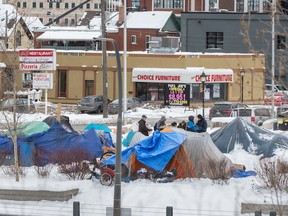Common sense judge defends City of Hamilton's right to tear down homeless camp
Get the latest from Adam Zivo straight to your inbox
Published Dec 25, 2024 • Last updated 4 hours ago • 4 minute read

An Ontario Superior Court judge issued a ruling Monday that the City of Hamilton did not infringe upon the Charter rights of 14 homeless people who were evicted from local park encampments between 2021 and 2023. As Canadian jurisprudence on this issue seems tinged with judicial activism, and has often protected violent encampments at the public’s expense, this decision is an unexpected victory for common sense.
Advertisement 2
THIS CONTENT IS RESERVED FOR SUBSCRIBERS
Enjoy the latest local, national and international news.
- Exclusive articles by Conrad Black, Barbara Kay and others. Plus, special edition NP Platformed and First Reading newsletters and virtual events.
- Unlimited online access to National Post and 15 news sites with one account.
- National Post ePaper, an electronic replica of the print edition to view on any device, share and comment on.
- Daily puzzles including the New York Times Crossword.
- Support local journalism.
SUBSCRIBE FOR MORE ARTICLES
Enjoy the latest local, national and international news.
- Exclusive articles by Conrad Black, Barbara Kay and others. Plus, special edition NP Platformed and First Reading newsletters and virtual events.
- Unlimited online access to National Post and 15 news sites with one account.
- National Post ePaper, an electronic replica of the print edition to view on any device, share and comment on.
- Daily puzzles including the New York Times Crossword.
- Support local journalism.
REGISTER / SIGN IN TO UNLOCK MORE ARTICLES
Create an account or sign in to continue with your reading experience.
- Access articles from across Canada with one account.
- Share your thoughts and join the conversation in the comments.
- Enjoy additional articles per month.
- Get email updates from your favourite authors.
THIS ARTICLE IS FREE TO READ REGISTER TO UNLOCK.
Create an account or sign in to continue with your reading experience.
- Access articles from across Canada with one account
- Share your thoughts and join the conversation in the comments
- Enjoy additional articles per month
- Get email updates from your favourite authors
Article content
The applicants, of whom all except one were drug users, argued that their evictions violated their Section 7 Charter rights (“the right to life, liberty and security of the person”) and consequently sought $445,000 from the city in damages.
In 2002, a B.C. Supreme Court case (“Victoria vs Adams”) interpreted Section 7 as granting homeless people a “right to shelter” under the justification that, without basic protection from the elements, individuals risk being exposed to life-threatening conditions. Since then, Canadian courts have prevented municipalities from evicting homeless camps unless it can be shown that enough local shelter spaces exist to provide alternative accommodations.
More recently, some judges have argued that shelter beds only count if they are “low-barrier” and “accessible.” Critically, a 2023 Ontario Superior Court ruling barred the City of Waterloo from evicting encampments because the presiding judge, Justice Michael Valente, believed that shelters cannot be truly accessible unless they allow on-site drug use.
The Waterloo ruling arguably constituted judicial overreach, as Valante used encampment evictions as a bargaining chip to push for contentious policy reforms (i.e. permitting drug use in shelters) without public consent. This eventually led Doug Ford’s government to threaten to use the notwithstanding clause, which immunizes designated laws from Charter challenges, to protect evictions from court interference.
By signing up you consent to receive the above newsletter from Postmedia Network Inc.
Article content
Advertisement 3
Article content
But in the new Hamilton ruling, presiding judge Justice James Ramsay took a very different approach than his colleague. Rather than credulously indulge the arguments made by Canada’s poverty activists, who romanticize encampments as benign and welcoming communities, he described on-the-ground realities with scathing moral clarity.
The judge found that the 2002 Adams case only granted homeless people the Charter right to set up temporary, overnight shelters to protect themselves. As neither daytime camping nor the formation of semi-permanent encampments were adjudicated then, no corresponding right to these things was established. According to Ramsay’s ruling, the City of Hamilton “did not prevent anyone from staying overnight” and only evicted campers during the day, so it was compliant with Charter jurisprudence.
Some of the applicants contradicted their peers and claimed that they had been prevented from camping overnight, but Ramsay did not believe them and prioritized evidence provided by city staff.
The judge questioned the trustworthiness of the applicants’ affidavits, and implied that poverty activists had interfered with their testimony. He observed that many of the affidavits “contained boilerplate” or sections that “were obviously drafted by lawyers,” and that, of the 13 applicants who suffered from drug and mental health problems, some of their recollections of being evicted “were hazy or were the product of what they were told.”
Advertisement 4
Article content
Ramsay argued that the applicants were asking him “to extend the right to stay in encampments to public parks in the daytime, that is, not to have to tear down and move every day.” He ruled against granting that request, primarily because homeless shelters already expect occupants to move every day, meaning that, if consistent standards are applied, this practice should not pose a Charter-relevant barrier to temporary, overnight camping.
Permitting daytime or indefinite encampment “would amount to expropriating property, or at least severely limiting property rights,“ argued Ramsay, who noted that, according to city officials, homeless people in Hamilton have become more “territorial” and “possessive” of “their” camps since the city passed more permissive bylaws in 2023.
He emphasized the “countervailing interest of preserving public parks” and stated that “the public is generally sympathetic to the homeless, but it tires of seeing its public spaces appropriated by lawless, unsanitary encampments.” He further noted that “the most vulnerable includes not only the homeless but also the elderly person and the child who wants to use a sidewalk or a city park without tiptoeing through used needles and human faeces.”
Advertisement 5
Article content
Ramsay was critical of the Waterloo case, and argued that Valente, in insisting that shelters must be “truly accessible” before any evictions be permitted, had set “arbitrary” and “impossible” conditions. According to the evidence provided to Ramsay, “accessible” shelters would have to simultaneously allow and not allow animals, allow and not allow couples, allow and not allow drug use, and allow and not allow people with antisocial mental health issues.
However, Ramsay clarified that, while it is implicit in his reasoning that he disagrees with the Adams and Waterloo cases, his decision remains consistent with the precedents they set.
The judge’s ruling relied heavily on the testimony of Dr. Sharon Koivu, an addiction physician from London, Ont., who works closely with the homeless. Koivu testified that encampments pose serious risks to occupants, including: hypothermia, arson, increased drug use and overdose, sexual violence and sex trafficking, assault, robbery, rodents and their associated diseases, as well as infections caused by exposure to faeces, needles and bodily fluids.
Advertisement 6
Article content
As described in the ruling, Koivu was “concerned that there is a developing, false narrative that encampments are a safe alternative form of housing,” and that this narrative, which appeared in some of the applicants’ affidavits, appears to have encouraged some of her patients to leave safer environments.
Ramsay argued that Section 7 rights are not endangered by encampment evictions, but rather by the risks of homelessness itself, which “lawless, dangerous and unsanitary” encampments exacerbate. He concluded that while the rights of the homeless must be balanced against the need for safe public spaces, “the democratic process is best equipped to achieve that balance” and “micro-management by judges will not be productive.”
National Post
Recommended from Editorial
-

Adam Zivo: If the courts won't let Ford clear the homeless out of the parks, Sec. 33 will
-

Adam Zivo: Toronto homeless camp eviction a win for the city’s working class
Article content
Get the latest from Adam Zivo straight to your inbox
.png)
 2 weeks ago
24
2 weeks ago
24



































 Bengali (BD) ·
Bengali (BD) ·  English (US) ·
English (US) ·